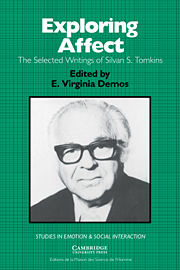Book contents
- Frontmatter
- Contents
- Foreword
- Editor's preface
- List of contributors
- Chronology
- Introduction
- Part I Affect theory
- Introduction
- Selections by Silvan S. Tomkins
- Part II Affect and ideology
- Introduction
- Selections by Silvan S. Tomkins
- Part III The face of affect
- Introduction
- Selections by Silvan S. Tomkins
- Part IV Script theory: The differential magnification of affect
- Introduction
- Selections by Silvan S. Tomkins
- Part V Human being theory: A foundation for the study of personality
- Introduction
- Selections by Silvan S. Tomkins
- A complete annotated bibliography of Silvan S. Tomkins's writings
- References
- Author index
- Subject index
- Titles in the series
Introduction
Published online by Cambridge University Press: 10 November 2010
- Frontmatter
- Contents
- Foreword
- Editor's preface
- List of contributors
- Chronology
- Introduction
- Part I Affect theory
- Introduction
- Selections by Silvan S. Tomkins
- Part II Affect and ideology
- Introduction
- Selections by Silvan S. Tomkins
- Part III The face of affect
- Introduction
- Selections by Silvan S. Tomkins
- Part IV Script theory: The differential magnification of affect
- Introduction
- Selections by Silvan S. Tomkins
- Part V Human being theory: A foundation for the study of personality
- Introduction
- Selections by Silvan S. Tomkins
- A complete annotated bibliography of Silvan S. Tomkins's writings
- References
- Author index
- Subject index
- Titles in the series
Summary
I am very grateful to Virginia Demos and her editorial collaborators for displaying in this book the major life work of one of the most creative psychologists of the second half of this century, and I expect many readers will come to share in my gratitude. Silvan Tomkins was and is highly esteemed by a small privileged company of psychologists who worked closely with him or found their way to and through his writings. At a step removed, he is substantially responsible through the work of Paul Ekman and Carroll Izard for the resurrection of interest in the psychology of affect and emotion during the 1970s and 1980s, and that is becoming known. But mainstream general psychology and the psychology of personality have paid insufficient heed to his contributions.
That was partly Tomkins's own fault. He was not an effective promoter of his own ideas. His magnum opus, Affect, Imagery, Consciousness, began to appear in the two volumes of 1962 and 1963, a full decade after he had arrived at his novel central conceptions and had written extensive drafts about them. These books lacked bibliographies, which were postponed to forthcoming volumes, volumes that did not come forth until 1991 and (posthumously) 1992 – three decades later. The volumes themselves do not do full justice to the breadth and power of Tomkins's psychological thought. Major aspects of his script theory and polarity theory – important developments in the intervening years – received only summary treatment in the final volumes.
- Type
- Chapter
- Information
- Exploring AffectThe Selected Writings of Silvan S Tomkins, pp. 1 - 12Publisher: Cambridge University PressPrint publication year: 1995
- 1
- Cited by



